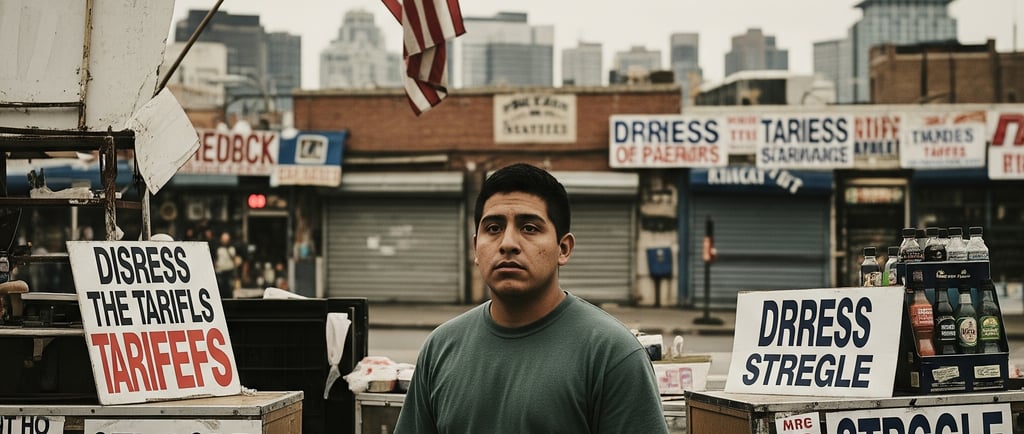Trump’s New Tariffs Ruled Illegal: U.S. States and Businesses Push Back in Court
6/15/20253 min read


In 2025, a new wave of trade uncertainty is sweeping across the United States.
In March, former President Donald Trump resumed his "America First" trade agenda by announcing sweeping reciprocal tariffs on imports from 59 countries, including China, Mexico, Vietnam, and Canada. He invoked the International Emergency Economic Powers Act (IEEPA) to justify this move.
But just a few months later, multiple U.S. businesses, state governments, and individuals have filed lawsuits against the federal government. In a major development, the U.S. Court of International Trade (CIT) has now ruled that Trump’s tariff proclamation violated the law and exceeded presidential authority.
This legal battle is more than a fight over taxes—it’s a broader test of executive power, administrative boundaries, and the survival of small businesses in the U.S.
⚖️ Three Key Lawsuits, One Clear Message: Presidential Overreach
Three central lawsuits have already resulted in defeats for the federal government at the Court of International Trade (CIT):
1️⃣ V.O.S. Selections, Inc. v. U.S.
Five importers sued the government, arguing that IEEPA was never meant to authorize broad trade tariffs. The court agreed, ruling that the president exceeded the intended limits of emergency powers.
2️⃣ States Coalition v. Trump
Twelve states including Oregon, California, Arizona, and Colorado challenged the tariffs for infringing on state-level economic rights and bypassing federal administrative procedures.
📌 The court ruled in their favor, marking the first recognition that overbroad executive actions can directly harm state interests.
3️⃣ Barnes v. U.S.
A small business owner from Montana claimed the tariffs pushed his business into bankruptcy, violating constitutional due process rights.
📌 The court dismissed the case on procedural grounds but left the door open for refiling, signaling sympathy toward individual harm claims.
🧭 More Cases in Federal Courts, Moving Toward Centralization
Beyond these CIT cases, other lawsuits have emerged in district courts across Florida, Montana, Washington D.C., and California:
✅ Emily Ley Paper Co. sued to block tariffs on Chinese stationery. The case is now consolidated at CIT.
✅ Webber v. DHS, filed by a Native American trader, argued that tariffs on Canadian imports violate treaty rights.
✅ Learning Resources Inc., a toy maker, claimed tariffs increased their import costs by 4,000%, threatening to shut down operations.
❌ California’s state lawsuit was dismissed in district court and is now on appeal to the Ninth Circuit.
📌 The U.S. Department of Justice is actively working to consolidate all tariff-related cases under CIT for consistency.
🧨 IEEPA Under Scrutiny: From National Security to Trade Tool?
At the core of Trump’s legal defense is IEEPA, a law originally passed to empower the president to respond to national security emergencies.
This time, there was no war, no attack, and no specific emergency—only economic complaints like “trade imbalance” and “fentanyl inflows.” Legal scholars warn this is a dangerous stretch.
“IEEPA was not designed to be a trade negotiation weapon or a personal tool of the president.”
— Prof. Samantha Gersen, Harvard Law School
The courts’ skepticism aligns with the “Major Questions Doctrine” reaffirmed in West Virginia v. EPA (2022), which limits executive actions on major economic issues without clear congressional authorization.
🔮 Looking Ahead: Will the Courts Rein in Tariff Power?
✅ Prediction 1: Appeals may partially succeed, but limits will remain
The government has appealed the CIT decisions. While some narrow grounds may survive, courts are expected to uphold limits on using IEEPA for broad economic actions.
✅ Prediction 2: Tariff refunds may follow, benefiting importers
If the rulings are affirmed, thousands of U.S. businesses could seek tariff refunds, especially those participating in consolidated lawsuits.
✅ Prediction 3: Future presidents may need stronger legal backing
The final outcome may set a precedent that presidents cannot unilaterally declare economic emergencies to impose trade penalties.
🧠 Final Thoughts: Power Must Be Authorized, Not Assumed
This legal saga is more than a tariff dispute—it’s a test of how far a president can go without congressional approval.
From a law intended for war and espionage to a lever for trade politics, IEEPA has morphed into a controversial executive tool. But the courts are pushing back, drawing lines around constitutional authority.
For importers, exporters, startups, and trade policy watchers, this case offers crucial lessons:
"No power without clear authorization" is not a slogan—it is the cornerstone of legal order.
